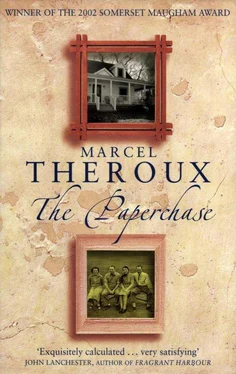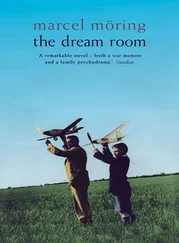Once when I was eight Patrick and I fell out over a game of Frisbee. My grandfather had given him a tin for cigarette butts that hung from a stake on the lawn. It was an ugly thing Grandpa had salvaged from the dump. My cousins had the idea of seeing who could knock it off with a Frisbee. No one could hit it and the game was losing its momentum when Patrick arrived, put fifty dollars in the tin and squatted behind the target like a catcher at home plate.
He would have been thirty-six, tall and dashing, every inch the successful writer. It had been a while since the Peanut Gatherers, but not yet an inexplicably long time. His hair was collar length, sort of late Beatles. He was tanned, solid, not yet balding, not yet jowly. He would have had owlish dark glasses, a T-shirt, black corduroys. Lydia was with him. The extravagant gesture with the money was probably intended to impress her.
We, the children, went insane with greed, flinging the Frisbee desperately at the tin from the line we had made with our shirts twenty or thirty yards away. The moment when I threw the Frisbee and knocked the butt-tin off the stake has a special exhibition space dedicated to it in my mental museum. I can enter it at will and poke around the related exhibits: the basketball boots I wore that summer, my brother’s huge black swimming goggles that made him look like a pioneer aviator, the dried-up minnow from a pair my cousin kicked on to a sandbar and let me keep. But the mainstay of this gallery is a recording of the moment when the Frisbee struck the can with a thunk! From various angles, I can watch my cousins charge forward to ransack its contents while I, out of my wits with greed and overexcitement, fall sobbing to the grass. Patrick scoops up the money before anyone else can get to it and insists that he knocked off the butt-tin as he caught the Frisbee behind it. A replay of the action contradicts him: he is a foot away from the can as the Frisbee strikes it, again, and again, and again.
To appease me, Patrick constructed a paper chase that led to some wholly unimpressive bribe. But the paper chase itself was a revelation. We insisted he create more. Once, each clue yielded a fragment of a map, drawn in brown ink and aged with the soot of a candle flame. Others were based on pictures, or riddles. ‘You’ve looked north, you’ve looked south, Now look for the clue in the genius’s mouth’ led memorably to a wad of paper that Patrick could barely conceal in his cheek for giggling.
Vivian and I even made paper chases for each other: ordeals of fifty clues that involved climbing trees and struggling through thickets of brambles. The pleasure was all in the anticipation. The treasure — candy, a book, a baseball glove — was discovered with a sense of deflation. My brother said he wished there was a paper chase where the reward was a paper chase. To me, that thought was nightmarish, as unacceptable as infinity or the endlessly repeating music of a fevered dream.
I couldn’t persuade myself that what I had found in Patrick’s notebook was meaningless. It seemed like a clue, if not one that would lead tidily to a Tootsie roll or a Three Musketeers bar. For a while, it fascinated me. I made various resolutions to find out more and went as far as ringing up the London Library until the inertia of my old routine drew me back in. The memory of Ionia grew very faint.
I doubt I would have thought about the story again, but two weeks after I got back, my father left a message on my answering machine asking me to call him. I was surprised. We had hardly exchanged a dozen words during my visit, which seemed to suit both of us, and I kept him waiting a few days on principle. When I finally rang him, he told me, in a more than usually resonant voice, that I was the chief beneficiary of Patrick’s will.
PATRICK HADN’T FORGOTTEN the rest of his family: on the contrary, his will had been drawn up with a thoroughness that made me think it was the final instrument of his anger against them. Patrick had the paranoiac’s gift of investing everything with significance. His other legacies were small and sardonic: a pasta machine for an overweight sister (Judith); the complete works of Frederick Rolfe for an illiterate and vulgar niece (Tricia); a mechanical penny-bank for my father, whom Patrick had always considered covetous. He had amended the document constantly, according to his persecution mania, and whom he considered to be his current enemies.
It seemed improbable that he would choose me to be his chief beneficiary. I felt a little like that horse that Caligula appointed to the Senate. But there was a crazy logic to it, too. In a way, I was the only person he could have chosen. The inheritance was mine by default. There was no one else.
The last thing in the world that Patrick wanted was for his family to benefit from his death. One way and another, he had fallen out with all of them, alienating them over the years with stinging letters or cold silences. He suffered from the worst kind of paranoia — the kind that has a firm basis in reality. Of course people talked about him behind his back. Of course people avoided him. Of course people were afraid of him — to have any dealings with him whatsoever was to risk coming into conflict with him. And the most trivial disputes could engender letters so offensive that the insults would be burned on to your consciousness for ever. ‘You have all the attributes of a dog except fidelity,’ he wrote to an ex-girlfriend. He once told my kindly Aunt Judith she was a two-hundred-pound puff adder.
I, in my dull job, neither rich nor poor, three thousand miles of ocean away, barely registered in his consciousness. I just hadn’t had the opportunity to get on his wrong side. I flattered myself that he might have been inspired by some fond memories from fifteen or twenty years earlier, but I knew that most of the arguments in my favour had been negative ones: it wasn’t who I was that mattered to Patrick, but who I wasn’t. Leaving the estate to me was bound to antagonise the whole family.
The terms of the will were strange, I suppose, but it would have been stranger still for them to have been normal. I had only been granted a life estate in Patrick’s house, its contents (apart from the things he’d left to his family), and the ten acres of lawn, marsh and sand dune that it perched on, along Ionia’s eastern shore. It was a condition of the will that the contents of the house were not to be dispersed, and the building itself was to be maintained as it had been in his life. To accomplish this, Patrick had created a trust which would remain the real owner of all his possessions. The trustees would oversee the property, making sure I didn’t do anything that would conflict with Patrick’s wishes, and looking after the money invested for its maintenance. If they thought I was failing to meet the conditions set down by my uncle, they were to assume control of the property and hand it over to a charity that ran rest homes for old churchmen. If I died intestate (it did strike me as odd that my uncle had made contingency plans for my death as well as his own), the estate reverted to the same charity.
After the initial excitement of the bequest, it was disappointing to realise that it was all hedged about with conditions. It was very typical of my family: I couldn’t see the gift for the strings. Patrick’s money was all tied to the maintenance of the house — which I couldn’t sell. Unless I went to live there, my life would change very little. My inheritance wasn’t going to provide me with an income. The trustees would release money if tiles blew off the roof of the house on Ionia, but not a penny would be available for me to redecorate my flat in Clapham. So that was that. I could forget about the casinos of the Riviera, endowing lectureships, and acquiring a stable of polo ponies. In all my fantasies of sudden wealth, I had imagined that the principal feeling would be one of enormous freedom. But the news of the inheritance hadn’t changed my life at all. My life was exactly the same. The only difference was that now I had an alternative: it came down to a straight choice — my life or Patrick’s.
Читать дальше












